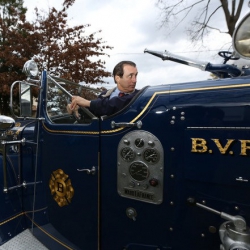New Jersey’s lawmakers are trying to legalize sports betting for a third time. That is what Assemblyman Ralph Caputo said in a conversation this week, as he described the latest plan to work around a federal ban on sports betting.
The Assemblyman is co-sponsoring the bill with South Jersey Assemblyman John Burzichelli. Caputo, who is from North Jersey, said, “We’re seeking to eliminate all the prohibitions that prevent New Jersey from having sports betting.”
Third Sportsbook Law since 2012
New Jersey has been down this road before. Back in 2011, the voters of New Jersey approved sports betting. That led to a 2012 law which legalized sportsbooks for Atlantic City. The law was challenged by the major US sports leagues, who defeated New Jersey in a series of legal battles from 2012 to early 2014.
Next, New Jersey tried to alter their laws a bit. They repealed many provisions in the original bill. The plan the second time was to repeal sports betting laws, then look the other way when Monmouth Park and William Hill ran a sportsbook. This once again attracted a lawsuit by the sports leagues. From October 2014 to August 2016, New Jersey lost a series of legal battles and appeals litigating that law.
No Mention of Sportsbooks
The proposed next iteration of the New Jersey sports betting law would have no mention of sportsbooks at all. In the last round of court cases, the Third Circuit Court of Appeals ruled that the law was illegal, because looking the other way on Monmouth Park while policing illegal bookies was a de facto way to legalize Monmouth Park.
Assemblyman John Burzichelli says that the new law addresses those concerns by ‘not addressing’ them.
Burizchelli said, “The courts are almost saying to us if you have no rules involving sports betting at all, then we have no purview here, you can do whatever you want to do. So this bill, which is really very much a work in progress, is designed to be a message to the federal government saying listen, we believe this is a state’s rights issue. Essentially we’ll take away all regulations related to sports betting.”
Using the Nuclear Option
The legislator calls this latest proposal “the nuclear option”, because it is an extreme way to allow New Jersey residents to gamble on sporting events. He said it’s a matter of asserting a state’s right to enact gambling law, instead of allowing the federal government to seize authority which it does not rightfully have.
Burzichelli said, “New Jersey citizens want to be able to bet on sports in a safe, controlled environment. The constitution reflects that. Our battle now is with the federal government who refuses to recognize this as a state’s rights issue.”
FDU PublicMind Poll
Fairleigh Dickenson University’s PublicMind poll service shows the people of New Jersey are 48% in favor of sports gambling and 39% against sports gambling.
State Senator Ray Lesniak said he plans to help draft the bill. Lesniak, who announced back in the summer that he plans to seek the Democrat’s nomination for New Jersey governor in 2017, said that the law has to be finely written in order to be legal.
Ray Lesniak on Writing the Bill
The trick, suggested Sen. Lesniak, is to write a law which protects the citizens of New Jersey from illegal bookmakers, while at the same time staying within federal law. Lesniak said, “It’s a gambit we have to study and look at, but it has to be controlled in a way that doesn’t violate the federal ban, at the same time doesn’t open it up to abuse.”
The law which New Jersey’s lawmakers refer to is the Professional and Amateur Sports Protection Act (PASPA). The bill was signed into law by President George H.W. Bush in 1992, but it had a one-year grace period which would have allowed states like New Jersey to pass pro-sports betting legislation.
1992 PASPA Law
Four states had exemptions grandfathered into the law: Nevada, Montana, Delaware, and Oregon. New Jersey failed to pass a sports betting law, because its leaders in the state senate worked to assure it never came to a vote on the legislative floor.
Twenty-four years later, that looks like an awful decision, because Atlantic City casinos and Monmouth Park could use the revenue boost sports gambling would represent. Atlantic City’s casino industry has gone from $5.4 billion in revenues in 2006 to $2.0 billion in 2015, causing a collapse in Atlantic City’s tax base and jobs market.
The latest proposal by Caputo and Burzichelli is likely to draw a third legal challenge from the United States sports leagues. Gov. Chris Christie has been criticized for spending millions on long shot case, but the next governor of New Jersey is likely going to have to decide to engage the NFL, NBA, and MLB in legal battles.

